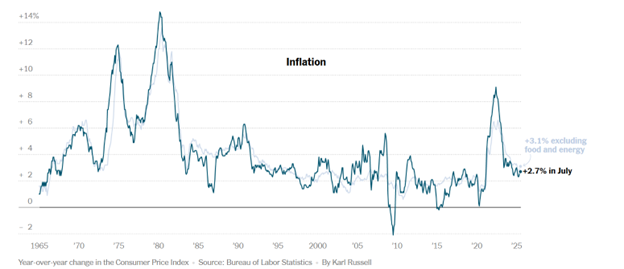Core Inflation Hit Five-Month High, Pressuring Discretionary Spending
U.S. inflation picked up in July, with the Consumer Price Index rising to 2.7% year-over-year, according to the latest Bureau of Labor Statistics data. Core inflation, which strips out volatile food and energy prices, climbed 3.1%, increasing at the fastest annual pace in five months after one of the largest monthly jumps this year.
On a month-to-month basis, overall inflation rose 0.2%, while core prices increased 0.3%, up from 0.2% in June. Notably, recreation-related prices, a category that includes some boating expenses—rose 0.4% from June to July.
The latest figures offer early evidence that tariffs are beginning to influence business costs and consumer prices. Following a period of relative price stability, some companies are now passing trade-related expenses on to buyers. Earlier strategies, such as absorbing costs or stockpiling imported goods ahead of tariff implementation, helped delay price hikes, but those measures may be reaching their limits.
While the inflation uptick did not surprise markets, it appears to be complicating the Federal Reserve’s decision-making. The Fed is still expected to resume interest rate cuts soon, though any sustained acceleration in inflation could delay those moves.
Why it matters for recreational boating
Higher prices for essential goods, such as food, energy, and housing, leave more price-sensitive consumers with less discretionary income for big-ticket items, including boats, accessories, and fuel. Even when annual wage growth keeps pace with inflation, short-term price spikes can temporarily erode purchasing power, dampening demand for leisure products. Further, higher-net worth consumer segments appear to be in a “wait and see” mindset as they navigate their own businesses and financial foresight. With tariff-related increases beginning to ripple through the market, the boating industry may face softer consumer spending in the months ahead.
NMMA’s statistics and insights provide members and industry stakeholders with timely, data-driven insights to help navigate shifting market conditions. By translating national economic indicators into actionable intelligence for the recreational boating sector, NMMA equips businesses with the context to anticipate consumer behavior, adjust strategies and make informed decisions in a rapidly evolving economic environment.
Note that the analysis in this article is provided by the NMMA Business Intelligence team using economic data provided from government sources as noted.
Learn more at https://www.nmma.org/statistics





